I did a rich assortment of off-colour Greek proverbs over at Nick Nicholas’ answer to What are some weird expressions?
A tuthree more off-colour sayings. Which I’ve actually tried to use in English, with decidedly mixed results.
- Τα μεταξωτά βρακιά θέλουν και επιδέξιους κώλους. Silk undies require agile arses. One must be equipped to handle the challenge one undertakes.
- Η γρια η κότα έχει το ζουμί. The old hen makes the [best] broth. Mature women are sexually satisfying.
- Από της μυλωνούς τον κώλο μην περιμένεις ορθογραφία. From the miller’s wife’s arse, one expects no orthography. If someone is uncouth, they will act accordingly.
- There’s some just-so story associated, of how the miller’s wife sat on some flour, and her assprint left an omega in a context where an omicron was expected.
Some sayings on Greek impulsiveness:
- Κάλλιο γαϊδουρόδενε παρά γαϊδουρογύρευε. Better to tie up the donkey than to go looking for the donkey. One should take precautions and think ahead.
- Του ρωμιού η γνώση έρχεται ύστερα. A Greek’s knowledge comes later (attributed to Turks). Turks think that Greeks do not take precautions and think ahead.
- Όπου ο Θεός δε δίνει γνώση, δίνει ποδάρια. Where God does not grant knowledge, he grants feet. If one does not take precautions and think ahead, one ends up running around playing catch-up instead.
A lovely couplet on someone making no sense, that my uncle used to use at me:
- Από την Έμπαρο κρασί, κι από τη Βιάννο λάδι/ κι από το Μυλοπόταμο ένα σακί κρομμύδια. Wine from Embaros, oil from Viannos, and a sack of onions from Mylopotamos.
And maybe the best meta-proverb ever, in Tsakonian:
- Τουρ οργήνιε του γέρου να νίνερε, του πφούντε σι να μη σι νίνερε. Hearken to an old man’s counsels—not his farts.


